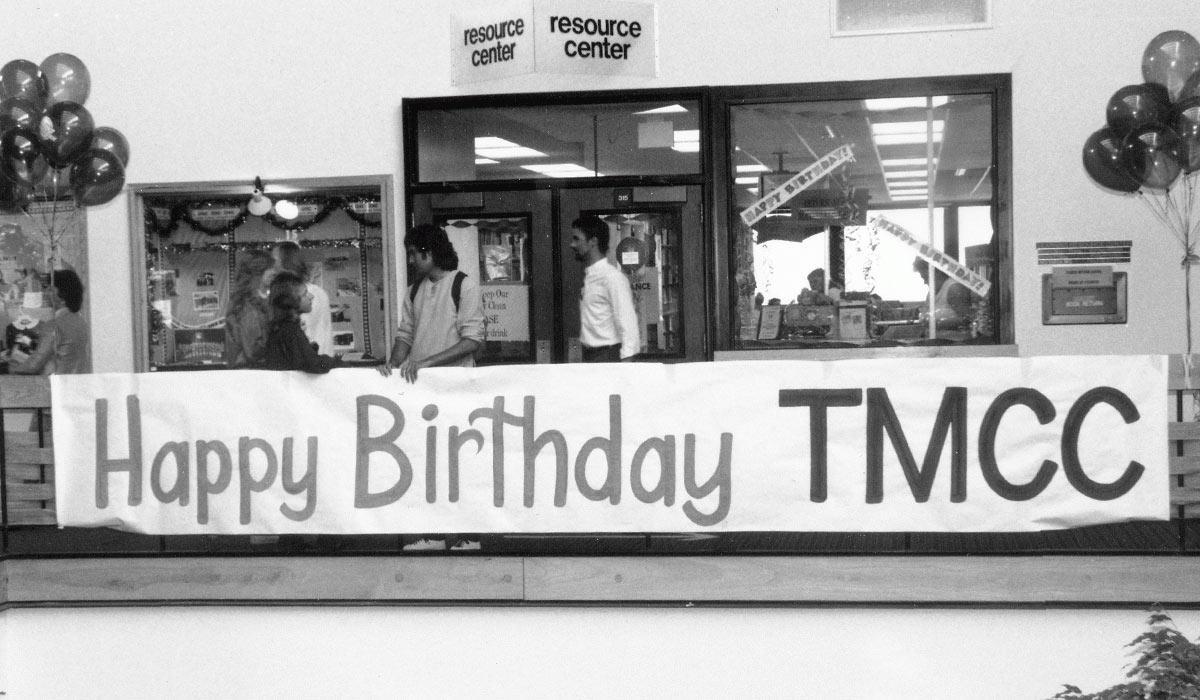
At the beginning of August 1971, Counselors William Cozart and Joe Ayarbe as well as Administrative Assistant Debbie Dick met with prospective students in a makeshift space at the Pioneer Theater Auditorium in downtown Reno. Nevada’s new community college, what was then the Western Nevada Community College "North Campus," would open its doors for the first time on August 30, had tasked these counselors with “screening students in, rather than screening them out.”
The article in the Sunday edition of the Nevada State Journal continued: “Because the college [was] organizing its first classes, unusual emphasis [was] given to help each applicant find the right courses which best suit his intents, abilities and vocational objectives… The college [was] open to everyone.”
Those words would begin a fifty-year legacy at TMCC of meeting students where they are, and doing whatever is possible to ensure students had access to higher education, and the support they needed to succeed.
Before Community Colleges in Nevada
It’s hard to imagine that just over a half-century ago, Nevada had no community colleges in the higher education system and that an institution that currently serves 11,000 students each year in state-supported programs and another 11,400 students in non-credit community education classes simply didn’t exist. The story of the emergence of community colleges in Nevada is an unusual one and the reason behind the year-long celebrations that will transpire over the 2021-2022 academic year.
By 1967 Nevada was the only state that did not have a community college system. Higher education had a surprising patron in Howard Hughes, who would donate $125,000 to keep the doors open for a community college in Elko and another $125,000 to the state for a feasibility study that would determine whether or not the state needed community colleges.
It turns out, the need existed, which is how Governor Mike O’Callaghan dedicated Western Nevada Community College (WNCC) as one of three community colleges in the Community College Division of the University and Community College System of Nevada (UCCSN) in 1971. Under the direction of Community College Division President Charles Donnelly, the predominant philosophy guiding these institutions was: don’t turn a student away, if anything, find a way to take care of them.
“That became embedded in the DNA of TMCC,” said Patricia Slavin, who was hired in 1973 at what was then known as the “North Campus” which was located in a building at the Stead Airport. Yet, the idea of “build it and they will come” is why the red hills of Dandini Boulevard did not remain empty for much longer: the need for affordable access to higher education and workforce training was indeed great. Slavin, along with other Admissions and Records staff, would often travel as far as Hawthorne, Gardnerville and Incline Village to register students for the upcoming semester.
One year, Slavin remembers holding registration at a local armory. Registration continued throughout the day with a long line of prospective students strung out from the armory—a line that did not diminish until the evening hours. “We were caught off guard by the volume and, although we recognized the need to refine our process to accommodate that volume, we also recognized that we had arrived. The community was telling us they wanted us here.”
That drive for improvement was something that Slavin said characterized the young TMCC and that remains an integral part of the culture of its faculty and staff, even fifty years later. “The reason the college has been at the cutting edge has to do with how we’ve always looked for ways to make things better. Students are truly at the forefront of what happens here,” she said.
The Celebration Starts with Commencement
While the number of programs, students served, and certificate and degree programs has certainly grown, the value attached to student success has remained virtually unchanged since its first students registered for classes in 1971. Since the first commencement ceremony in 1972—which was held at the Pioneer Theater in downtown Reno in which 29 graduates were honored—to 2021 when TMCC will award 23 bachelor degrees, 1,382 associate degrees and 196 certificates of achievement at a socially-distanced commencement ceremony during a global pandemic, the centrality of student success has continued to be a solid foundation for an institution that will continue to support the community in the years to come.
"For fifty years, TMCC has been dedicated to student success through high-quality transfer, workforce training, and continuing education," said TMCC President, Dr. Karin Hilgersom. "We are celebrating this incredible milestone as a reminder of our marvelous journey as the community's college, and to celebrate our growth and achievements as ‘The College for the New Nevada.’ Our 50-year steadfast commitment to student access, success, and educational excellence has not waned. Our added focus on values related to health, including a healthy environment, signals our capacity to adapt to a world vastly changed since TMCC's 1971 start date. We invite the Reno and Sparks communities that we serve to join us this year in celebrating so many remarkable milestones!”
From one single building to several at four locations throughout the community, TMCC still insists on innovative approaches to student success, as well as aligning education with the evolving needs of our community. Throughout the year, we will continue to share stories of these unique successes that demonstrate a long-standing dedication to education and success.
“There was always an underlying sense that we were involved in something really important and, looking at TMCC’s reputation today, that feeling is reaffirmed,” said Slavin.
Join the Celebration
TMCC’s 50th Anniversary Celebration begins with the 2021 Commencement ceremony. The year-long celebration will include a series of alumni stories, on-campus events and announcements on our website dedicated to the celebration.
For more information about TMCC’s 50th Anniversary celebration, contact the Marketing and Communications department at 775-673-7087.